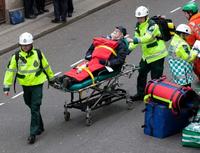-
Innovative CCTV protects copper cables
The theft of copper cables has cost the British economy an estimated £770 million a year over the last few years; British company which rely on copper cables to deliver their services are deploying an innovative CCTV to combat the thieves
-
-
U.K. police learning to battle cartels in El Paso
This week law enforcement officers from the United Kingdom are in El Paso, Texas to train with DHS; the special agents from the U.K.’s Serious Organized Crime Agency are in town specifically to learn how to combat the growing threat of trafficking
-
-
No racial profiling, abuse by Secure Communities
The Earl Warren Institute at the University of California, Berkeley Law School claimed that DHS Secure Communities program suffers from a disturbing pattern of abuse of authority by ICE, including wrongful arrests of thousands of U.S. citizens, a pattern of racial profiling against Latinos, and denial of due process for aliens in removal proceedings; a new study by the Center for Immigration Studies says this is not the case
-
-
Company develops telephone line “fingerprint” detector
Researchers at Pindrop, a new security company, have developed technology that can read telephone line “fingerprints” to prevent fraud and identify a caller
-
-
FBI increasingly concerned with “sovereign citizen” movement

Over the past decade, the FBI has grown increasingly concerned with the “sovereign citizen” movement; since 2000, sovereign citizens have killed six police officers and violent battles with law enforcement agents are on the rise; the U.S. National Counterterrorism Center classified the movement as a major threat alongside Islamic extremism
-
-
Taser rolls out redesigned wearable cameras

Last week Taser, the manufacturers of the electric stun guns, unveiled its newly remodeled wearable camera system which is sleeker and more advanced than its predecessor; the Axon Flex, introduced less than a year after the company rolled out its first wearable cameras, represents a significant upgrade
-
-
London holds massive Olympic security drill

Last week, in preparation for the London 2012 Olympic Games, more than 2,500 government officials, local police, and emergency responders participated in a two-day long emergency drill that simulated a terrorist attack on the city’s transportation network
-
-
Anthrax-decontamination foam used in meth lab cleanup
The meth cleanup problem in the United States is a big one; the U.S. Drug Enforcement Administration lists thousands of locations where law enforcement agencies have found chemicals or paraphernalia indicating the presence of either clandestine drug laboratories or dumpsites; Sandia’s decontamination foam, originally developed to deal with anthrax, is now also a meth eraser
-
-
Surveillance truck helps Fort Lauderdale keep streets safe
Police in Fort Lauderdale, Florida are trying a new approach to fighting crime – blatantly telling criminals they are under surveillance
-
-
In Keene, N.H., locals oppose military equipment for police
With the help of a $285,933 DHS grant, local police in Keene, New Hampshire were all set to purchase a new armored vehicle until local residents got wind of the plan; the citizens of the quiet New Hampshire town of 23,000, which has only seen two murders since 1999, questioned why police needed such an expensive military-type truck and balked at the militarization of a local force; with federal counterterrorism money continuing to pour into local communities, lawmakers and residents across the country will have to grapple with the same issues as Keene and determine what kind of police force they want to have patrolling the streets
-
-
Accenture develops crime management system for Norway
Accenture is developing a new national crime management system for the Norwegian National Police Directorate (POD) to support police investigations and criminal prosecutions in Norway; the crime management system will enable the Norwegian police force to manage, link, and analyze case information and intelligence for more reliability and consistency across law enforcement, police investigations, border management, emergency response, and case administration
-
-
Law enforcement supports N.Y. DNA database expansion
A growing number of New York law enforcement officials have backed Governor Andrew Cuomo’s proposal to expand the state’s DNA Databank
-
-
Major shipping companies inadvertently aid smugglers
A new study on sea trafficking reveals that the large majority of ships involved in the illegal transfer of weapons, drugs, and banned missile or WMD equipment are owned by major shipping companies in the United States, Germany, and Greece
-
-
Smithsonian balances security and openness – is it safe?

Following the 9/11 attacks security officials worried that the Smithsonian Institution with its millions of visitors and stores of valuable national treasures would be an ideal target for terrorists, yet the institution has done little to bolster security
-
-
Indianapolis emergency response center opens days before Super Bowl
With only a few days left until Super Bowl XLVI, which will be held in Indianapolis this year, security officials there unveiled a new emergency coordination center on Wednesday
-
More headlines
The long view
How Male Grievance Fuels Radicalization and Extremist Violence
Social extremism is evolving in reach and form. While traditional racial supremacy ideologies remain, contemporary movements are now often fueled by something more personal and emotionally resonant: male grievance.
